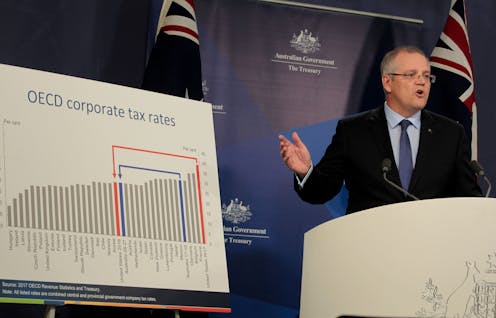How the government can pay for its proposed company tax cuts
- Written by David Ingles, Senior Research Fellow, Tax and Transfer Policy Institute, Crawford School of Public Policy, Australian National University

There are ways the government can pay for a cut in the company tax rate. In a recent working paper, we worked with researcher Chris Murphy to model three different options: reforming Australia’s system of giving shareholders tax credits, allowing less tax deductions on interest for companies, and introducing a tax on the super-profits of banks and miners.
After taking economic growth into account, the budget cost of the tax cut could be net A$5 billion a year.
Read more: Race to the bottom on company tax cuts won't stop tax avoidance
In the US, a company tax cut to 21% continues an inexorable global trend of cutting rates, making international tax competition even more pressing. As our working paper noted, Australia’s rate is now higher than most other countries, making tax avoidance even more attractive and deterring inbound foreign investment.
A cut in the Australian company tax rate to 25 or even 20% is important because it will attract foreign investment, boosting wages and the economy in Australia.
Remove dividend imputation
Australia has an unusual system of integrated company and personal tax, called dividend imputation. It has been in place since the 1980s.
Australian shareholders receive franking (imputation) credits for company tax. If shareholders are on a personal tax rate less than 30%, they receive a refund.
The company tax cut could be financed by removing dividend imputation. Our modelling indicates a company tax rate of 20% would mean the government breaks even, while halving imputation could finance a 25% rate.
It would be simpler to abolish dividend imputation and replace it with a discount for dividend tax, at the personal level.
Read more: Qantas and other big Australian businesses are investing regardless of tax cuts
Dividend imputation only makes sense if we assume Australia is a closed economy with no foreign investors. In reality, Australia depends on inflows of foreign investment. About one-third of the corporate sector is foreign owned.
The likely source of additional finance, especially for large Australian businesses, is a foreigner who does not benefit from dividend imputation. So the company tax pushes up the cost of capital and domestic investors benefit from franking credits for a tax they don’t actually bear.
But the politics of making a change to the system are difficult, because domestic investors, especially retirees on low incomes and superannuation funds would lose out. But this approach could benefit workers, jobs and Australian businesses.
Broaden company tax by removing interest deductibility for companies
Another approach is to remove or limit deductibility of interest for companies. This can raise the same revenue at a lower rate, by allowing less deductions. Excessive interest deductions are used by multinationals to reduce their Australian tax bill, as shown in the recent Chevron case.
This would be like imposing a withholding tax on interest paid offshore. We explore a comprehensive business income tax on all corporate income. Modelling shows that this tax would finance the rate cut to 25%.
The comprehensive business income tax raises some difficult issues for taxing banks. This is because their profit is interest income less interest expense.
But there are numerous policies to restrict interest deductions already in place, here and around the world. These restrictions could be expanded. For example the thin capitalisation rules limit of the amount of loans a business can have relative to equity.
We still need anti-abuse rules because businesses can use other methods to minimise tax, as canvassed by the OECD in its Base Erosion and Profit Shifting project, including transfer pricing, and deductible payments offshore for intellectual property fees.
A rent tax or allowance for equity
A third option for a company tax cut is to change to a tax with a lower effective marginal rate. This means that the return on a new investment is taxed less heavily than under a company income tax.
We could introduce an allowance for corporate equity, or corporate capital, which provides a deduction for the “normal” or risk-free return for capital investment. This is also called an economic rent tax because it only taxes the above-normal profit.
Modelling shows that the allowance for corporate capital encourages new investment, which helps economic growth, but there is a large budget cost. The extra deduction reduces the overall tax take and so a higher rate is needed for the same revenue.
It is unlikely Australia would want to maintain or increase our company tax rate, as this directly contrary to the global trend and can lead to even more tax planning by businesses.
For Australia, a supplementary rent tax aimed at the financial and mining sectors – where above-normal returns are known to occur – could be combined with a lower company income tax. Modelling this option for the finance sector shows a large welfare gain and sufficient revenue to fund the rate cut to 25%.
The government has a lot of choices
We show that the government has many options available to finance the needed corporate rate cut and improve efficiency of the company tax.
Policymakers could mix and match these options. Dividend imputation could be replaced with a discount and combined with a comprehensive business income tax. Limits on interest deductibility could be combined with a part allowance for corporate capital.
Replacing dividend imputation with a dividend discount at the personal level could be the best initial step. Other options for major reform of Australia’s company tax need to remain on the table, as company taxes drop to a new low and systems are reformed around the world.
Authors: David Ingles, Senior Research Fellow, Tax and Transfer Policy Institute, Crawford School of Public Policy, Australian National University
Read more http://theconversation.com/how-the-government-can-pay-for-its-proposed-company-tax-cuts-92739



















